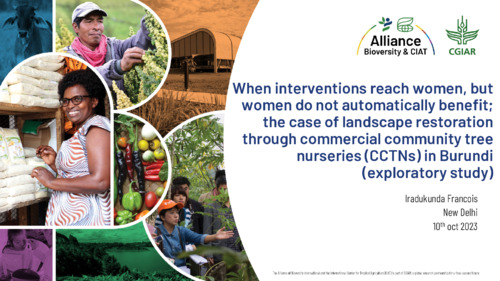When interventions reach women, but women do not automatically benefit; the case of landscape restoration through commercial community tree nurseries (CCTNs) in Burundi (exploratory study)
The Landscape Restoration and Resilience project in Burundi established commercial community tree nurseries (CCTN) aiming (1) to satisfy the increased demand for trees in areas to restore, and (2) to build the economic resilience of CCTN members in Buhinyuza (Muyinga) and Isare (Bujumbura) communes of Burundi. This study analyses the role and participation of women in CCTN in Burundi and the impacts of CCTN on the well-being and empowerment of the women involved. We conducted 33 mixed and sexdisaggregated focus group discussions in the project areas and analyzed the documents of the community nursery associations. We use the ‘Reach-BenefitEmpower-Transform’ (RBET) framework to analyze our results. Women are highly represented in CCTNs (63%) and participate in most of CCTN’s key activities, such as watering and regular weeding. However, the sharing of profits is based on an initial monetary investment, of which men hold a major part. The active participation of women in associations is perceived as a space to share life experiences and pathways to increase their ability to perform traditionally men’s incomegenerating activities. Even though the CCTN initiative reached more women than men through participation, benefits to women are limited. There are some signs of social empowerment and normative transformation that are not necessarily associated with benefits. We recommend identifying pathways to increase benefits to women and contribute to their economic empowerment. The RBET framework is a useful tool to explicate the value of women’s current participation in CCTN while giving direction for more impactful participation and organization of CCTN.

